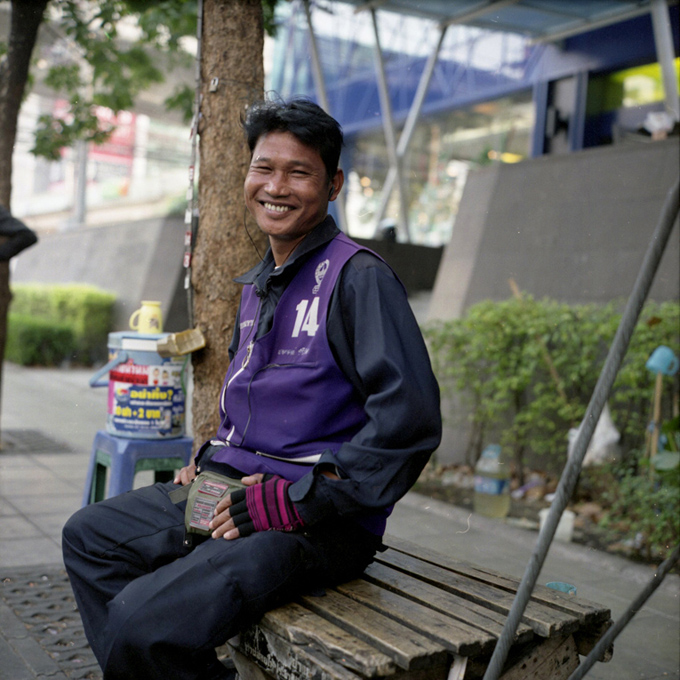Over the next months while the Design with the Other 90%: CITIES exhibition is on display at the United Nations Headquarters in New York several individuals whose own research explores the exhibition’s subject matter have been invited to write blog entries sharing their insights, related research and projects. – Cynthia E. Smith, Curator of Socially Responsible Design, Cooper-Hewitt, National Design Museum

Motorcycle taxis: an informal solution for traffic ridden cities
Every day millions of urban dwellers navigate Bangkok on the back of a motorcycle taxi, zigzagging through traffic or flowing into the sleepy movement inside narrow alleys. Outside Thai homes, offices, or shopping malls small groups of drivers sit in the ear-splitting noises of the city, scanning for potential clients. Few words are muttered between drivers and their passengers as they transport them through the city to their destinations. Bills pass hands, and soon, clients forget of the vessels and their captains who navigate the city. Today about 200,000 drivers operate in Bangkok, allowing the city to function, people to reach their destination in time, newspapers to be ready in shops in the morning and lunches to be delivered to offices. Each driver averages 20 to 30 trips per day, and collectively, the motorcycle-taxi industry delivers between 4,000,000 and 6,000,000 trips per day day—about eight times the number of passengers carried daily by Bangkok’s elevated trains and subways combined. Without the motorcycle taxis, the city would immediately come to a halt, stuck in traffic. 
A motorcycle-taxi driver waits for clients in front of a shopping complex.
In my own research, “The Owners of the Map: Motorcycle taxi drivers, mobility, and politics in Bangkok”, I explore the emergence and internal functioning of the motorcycle-taxi industry, as well as the drivers’ personal histories, and their attempts to be recognized as stake holders and service providers in the city. An anthropological analysis of creative ways to find more equitable and sustainable – both economically and socially – forms of transportation. The project looks at one city where motorcycle taxis are taking over, unnoticed, the burden of an unsolvable transportation mesh. My research presents the multiple roles the drivers play as transporters, messengers, and mediators, both in the life of their neighborhoods and between the city and their villages in the Thai country-side. The project was conducted in close collaboration and information-sharing with the newly formed motorcycle-taxis’ trade union of Thailand. The research offers not only an academic study of the internal functioning of informal transportation in Bangkok but also presents policy suggestions for the administration of the drivers and their inclusion into a social-welfare system. Similar processes are taking place in cities of the Global South, from Caracas to Jakarta, Abuja to Kampala, Manila to Rio de Janeiro.
Claudio Sopranzetti is a PhD student in Anthropology at Harvard University. He has been working on issues of equitable cities and urban life in Europe, East Africa, and Southeast Asia. http://harvard.academia.edu/ClaudioSopranzetti www.sopranz.blogspot.com All image credits: Agnes Dherbeys